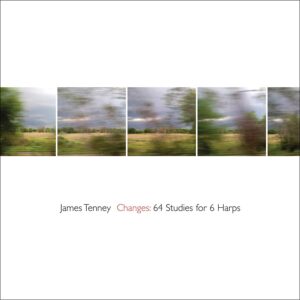I won’t discuss the elaborate theoretical and compositional rigor (both human and computerized ) behind James Tenney’s 64 Studies for Six Harps, collectively titled Changes. The booklet notes do so in painstaking detail. Instead, I’ll try to describe what I hear. Some studies involve single notes passed around between harps. Others contain polyphony with various levels of density. The music never moves fast, yet the fluid asymmetry of the rhythm holds your attention, as does Tenney’s microtonal tuning system. The dynamic range is not particularly wide, yet I like how the harps appear to be placed in different spatial perspectives, with some close up, some farther back, and others parked in neutral. Imagine a sonic parallel to one of Alexander Calder’s spacious mobiles, and you’ll understand what I mean. But don’t expect idiomatic “harpy” effects like big, splashy chords or whirlpools of glissandos; Tenney’s sound world rarely journeys beyond plucks, strokes, and occasional jabs.
Certain moments convey unquestionable delicacy, beauty, and harmonic interest, such as the opening part of Study No. 12, or Study No. 20’s contrast between ringing bass notes and accented single pitches in higher registers. Other studies tend to meander before they find their footing. While the booklet notes allude to an overall conceptual or structural arc, it’s difficult to perceive this solely by listening. I should know, because I endured all 64 studies in a single, nearly uninterrupted hearing. I didn’t notice the subtle progressive motivic, rhythmic, and register transformations with which Morton Feldman usually sustains soft and slow-moving scores over large time scales. But perhaps that is not the point of this magnum opus.
Personally I find it more satisfying to dip in and out of the 64 studies as they progress, absorbing several at a time, to let my mind wander, then come back for more, and then move on. It’s ironic how Tenney’s lofty aspirations and the immense efforts steering Changes’ posthumous realization ultimately yield 142 minutes’ worth of basically gentle, unprepossessing music. A high level of care and dedication clearly informs both the performance and the engineering.
































